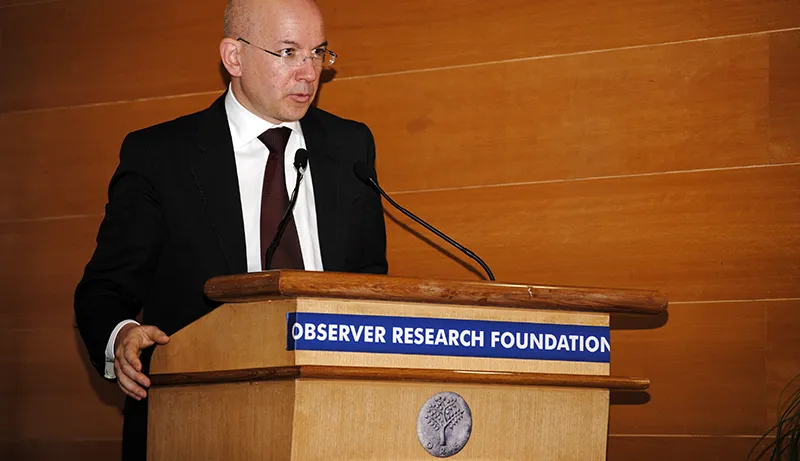-
CENTRES
Progammes & Centres
Location
There has been a large degree of unpredictability with which political movements have gained weight in the region, making providing humanitarian aid to affected areas very difficult, according to the chief of the International Committee of Red Cross.

As the political ramifications from the Arab Spring unravel some things have become abundantly clear. According to Mr. Yves Daccord, the Director-General of the International Committee of the Red Cross (ICRC), there has been a large degree of unpredictability with which political movements have gained weight in the region, and unfortunately this has made providing humanitarian aid to affected areas very frustrating.
Mr. Daccord, delivering a talk on "Arab Spring and Future Humanitarian Challenges" at Observer Research Foundation on the 11th of March, 2013, stressed the need to allow different perspectives to come together in order to enable an impartial humanitarian effort to help those whose lives and livelihoods have been impacted by the political movements termed the Arab Spring.
Mr. Daccord believes that it is problematic to contain the situation to the Arab world while also noting that there were several differences in the movements. Some states have been tasked with rebuilding political institutions such as Egypt and Tunisia, whereas Libya has been faced with a more difficult transition in light of the civil war and the NATO intervention that followed. With regards to Syria, the conflict is ongoing and political restructuring is just a singular element of a long road to recovery. Yet Mr. Daccord noted that there are several similarities that can be attributed to the various movements.
All were bad regimes that were divorced from their civil societies, in addition to a strong fear factor that they imposed on their people. The political movements have been spearheaded by the youth, who have embraced new concepts of liberty and civic representation in the face of modernisation. Mr. Daccord pointed out the integral role played by the internet, with social media networks providing the ideal platform for coordinating protests. He also stressed that the movements have been largely leaderless and have been a populist struggle against oppression.
Some of the factors that have influenced these movements are fairly obvious such as bad governance and political oppression. But Mr. Daccord noted that some factors are not as direct. The global financial crisis has affected food prices, and this has put tremendous pressure on developing societies. The high costs of basic staples definitely played a role in galvanising popular opinion against the state. He also brought to light the fact that in light of Europe’s ongoing financial crisis and the austerity measures taken in response to it, the capacity to give aid to developing and conflict struck countries has greatly been reduced.
As a humanitarian organisation, the ICRC’s priorities have always been to provide effective relief to areas witnessing violence and oppression such as Mali and Syria. But the situation has proved to be harder than expected, notably due to the presence of several armed non state actors with divergent political agendas. Therefore this multi-dimensional conflict cannot have a one-dimensional response. Mr. Daccord stressed that the ICRC must be able to understand and channel the phenomena of non-leadership by engaging with the non state actors involved in the conflict. He also suggested that the ICRC efforts must not be limited to physical relief but also include a psychological component.
Mr. Daccord claimed that the ICRC must also be impact driven rather than abide by an ideological code. He also stated that the ICRC must address direct needs (emanating from the current conflict) in addition to the chronic needs that have prevailed over time. For example, when the Red Cross team was conducting its operation in Haiti, following the 2010 earthquake, they were shocked to learn of the conditions in rural Haiti, where socio-economic problems could not be attributed just to the devastation of the disaster. What this suggests is that humanitarian efforts by NGOs other than the Red Cross, must not be drafted in an office in the developed world but rather require an entrenched presence on the ground.
When questioned about the specific indicators linking the global financial crisis to the political movements of the Arab Spring, Mr. Daccord stressed that for the first time the national Red Cross of Spain did not have a portfolio on countries like Somalia, but rather focussed on unemployment in Spain and promoted efforts to improve their economic position. Similarly countries like Greece and Italy changed their immigration policies. This implies that countries that were once focussing on providing aid to conflict zones and investing in developing countries are now focussing on their own economic woes. Questions were also raised regarding the civil war in Syria, it was suggested that the situation is reminiscent of the Rwandan genocide.
Mr. Daccord urged caution with the use of the word genocide, suggesting that although the conflict has left thousands dead, it is not yet genocide. However, he believed that unless effective measures were initiated to cease hostilities, the conflict could take an ugly turn, especially due to the increasing role being played by sectarian tensions. The event was moderated by Mr. Kanwal Sibal, former Foreign Secretary, while Mr. Sunjoy Joshi, ORF Director, gave the welcome remarks.
(This report is prepared by Kartikeya Khanna, Research Assistant, Observer Research Foundation, Delhi)
The views expressed above belong to the author(s). ORF research and analyses now available on Telegram! Click here to access our curated content — blogs, longforms and interviews.